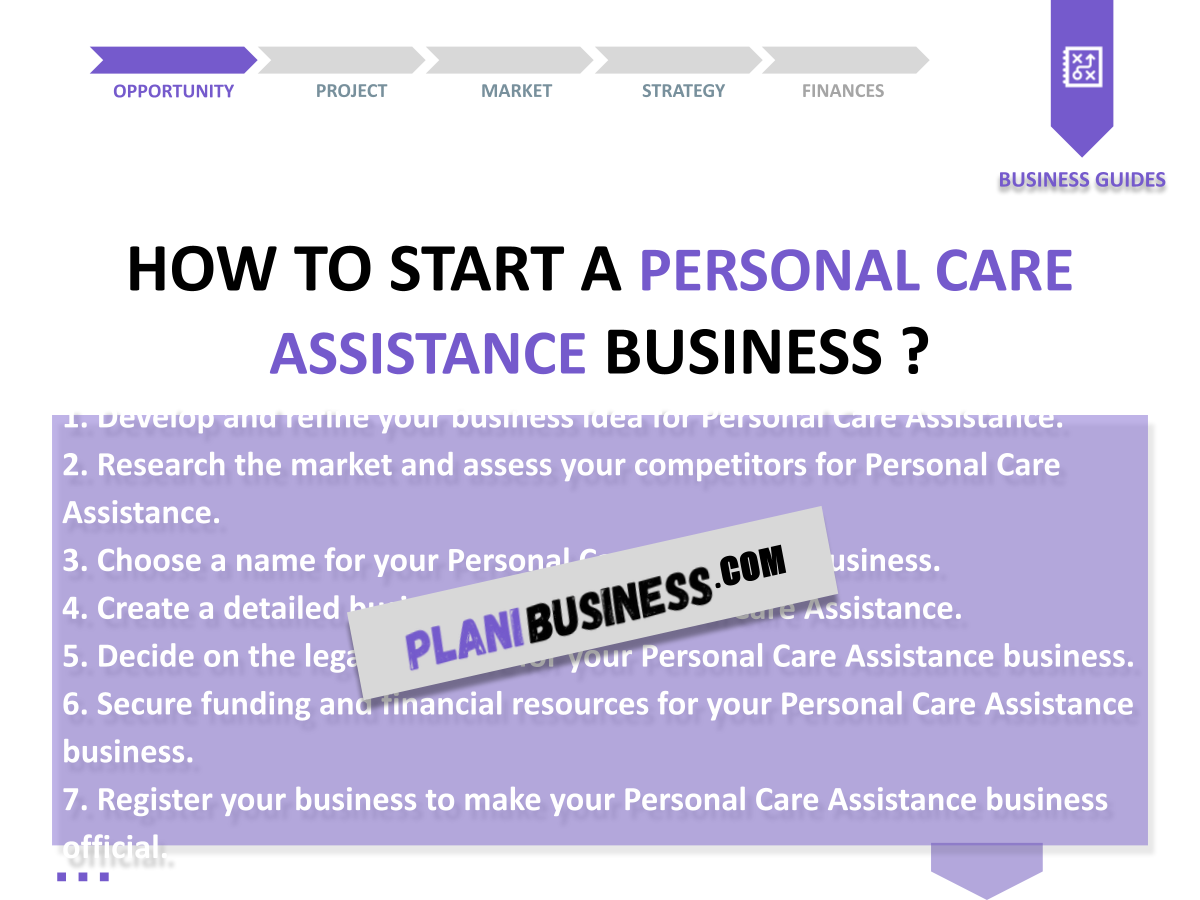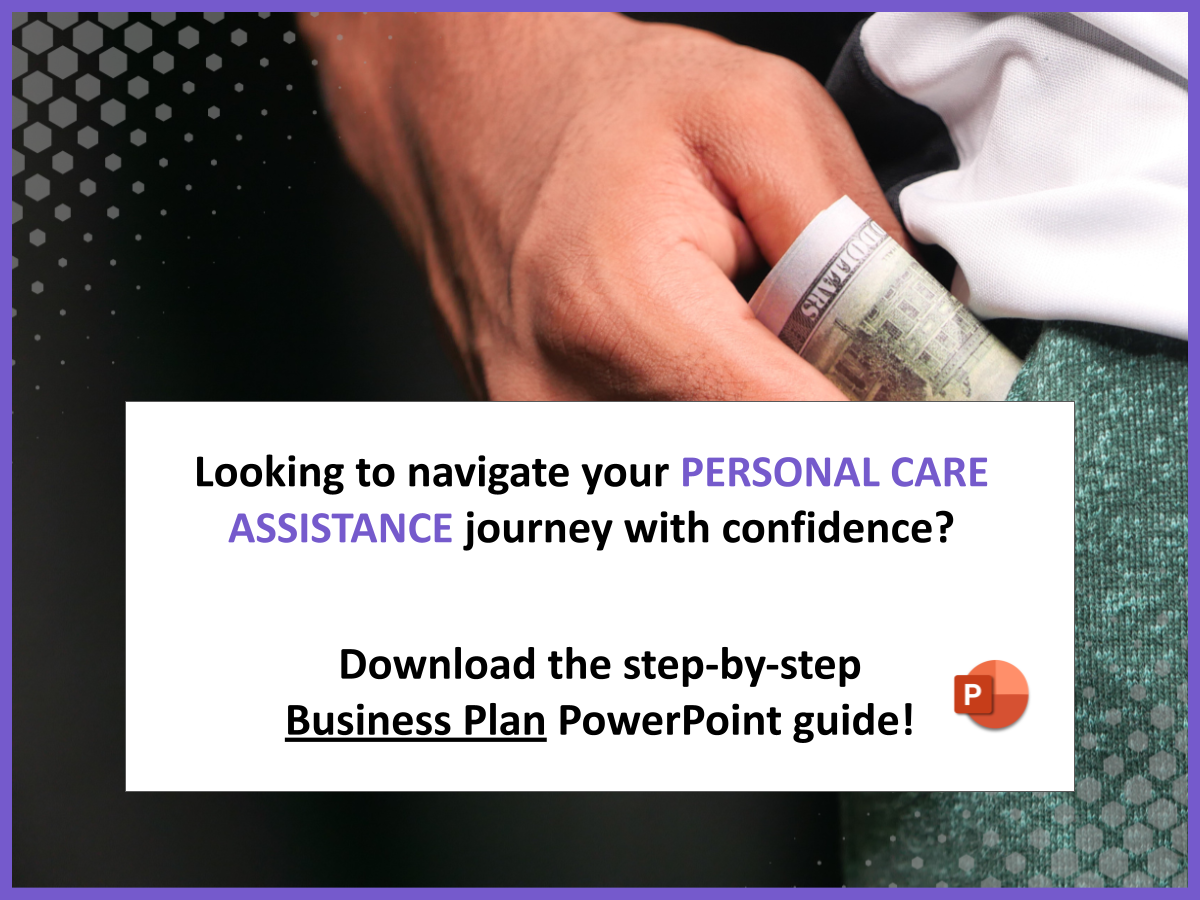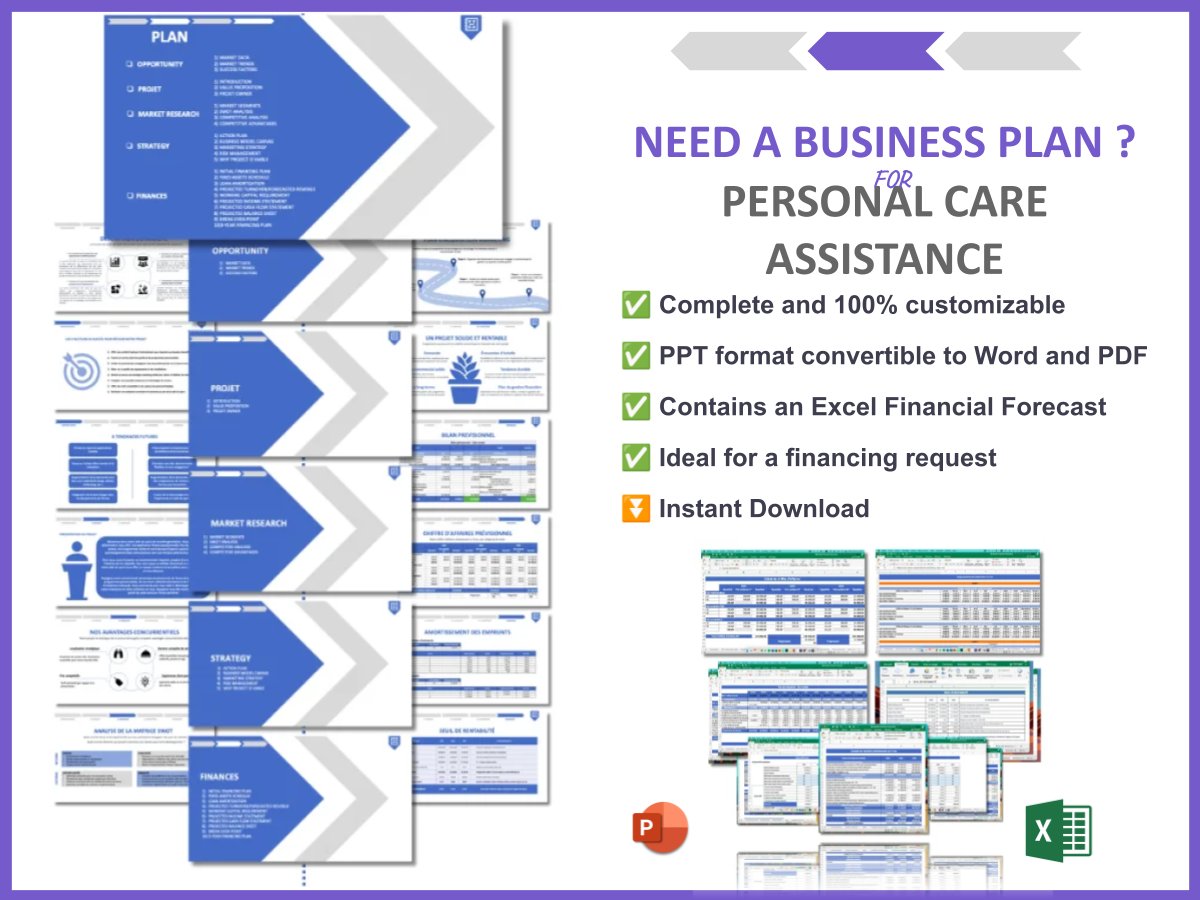Are you thinking about starting a Personal Care Assistance business? You’re not alone! The demand for personal care services is on the rise, with more people seeking help to maintain their independence while receiving care in their homes. Personal care assistance encompasses a range of services that support individuals with daily activities, such as bathing, dressing, and meal preparation. These services are vital for enhancing the quality of life for many, especially the elderly and those with disabilities. In this article, we will cover essential steps and insights for aspiring entrepreneurs in the personal care industry:
- Understanding personal care assistance and its importance
- Developing your business idea and niche
- Conducting market research
- Creating a detailed business plan
- Choosing the right legal structure
- Securing funding and resources
1. What is Personal Care Assistance and Why is it Important?
When we talk about Personal Care Assistance, we refer to the services that help individuals with daily living activities. This includes everything from personal hygiene to meal preparation. The importance of these services cannot be overstated, especially as our population ages. Here are a few key points that highlight why this sector is crucial:
- Statistics: By 2030, it’s estimated that one in five Americans will be over the age of 65, leading to an increased demand for personal care services.
- Quality of Life: Personal care assistance allows individuals to live independently, which can significantly enhance their quality of life.
- Family Support: Many families are unable to provide the necessary care due to work or other commitments, making professional assistance invaluable.
In summary, starting a business in personal care assistance not only fulfills a critical need but also presents a rewarding opportunity for those looking to make a difference in their communities.
2. How to Develop Your Personal Care Assistance Business Idea?
Before diving into the logistics of starting your business, you need to refine your business idea. Here are some steps to help you develop a clear and actionable concept:
- Identify Your Niche: Think about the specific services you want to offer. Are you focusing on elderly care, disability support, or perhaps post-operative assistance?
- Assess Your Strengths and Weaknesses: Reflect on your skills and experiences. What do you bring to the table that can enhance your services? This self-assessment can help you determine your unique selling proposition.
- Gather Feedback from Potential Clients: Reach out to your target demographic or their families. Conduct surveys or informal interviews to understand their needs and preferences.
Additionally, consider creating a SWOT analysis (Strengths, Weaknesses, Opportunities, Threats) to evaluate your business idea comprehensively. This can provide clarity on how to position your business effectively.
| SWOT Analysis | Details |
|---|---|
| Strengths | Unique services, personal experience in caregiving |
| Weaknesses | Limited funding, lack of experience in business management |
| Opportunities | Growing elderly population, increasing demand for home care |
| Threats | Competition from established agencies, regulatory changes |
By clearly defining your business idea and its unique aspects, you’ll be better prepared to tackle the challenges ahead in the personal care industry.
3. What Market Research Should You Conduct for Your Personal Care Assistance Business?
Conducting thorough market research is vital for the success of your Personal Care Assistance business. It helps you understand your competition and the needs of your target audience. Here are some steps you should take:
- Analyze Competitors: Look at other personal care assistance providers in your area. What services do they offer? What are their strengths and weaknesses? This can help you identify gaps in the market.
- Identify Target Market Demographics: Determine who your ideal clients are. Are they elderly individuals, people with disabilities, or those recovering from surgery? Understanding your audience will help tailor your services to meet their needs.
- Gather Insights on Pricing and Services: Research how much competitors charge for similar services. This can help you set competitive prices while ensuring profitability.
Additionally, consider utilizing online surveys or community forums to gather feedback directly from potential clients. This firsthand information can be invaluable in shaping your service offerings.
| Research Focus | Details |
|---|---|
| Competitor Analysis | Identify at least three competitors and analyze their services and pricing. |
| Demographic Research | Collect data on the age, income, and needs of your target market. |
| Feedback Collection | Use surveys or focus groups to understand client needs and preferences. |
By conducting comprehensive market research, you’ll be well-equipped to carve out a niche for your personal care assistance business and meet the demands of your clients effectively.
4. How to Create a Detailed Business Plan for Your Personal Care Assistance Business?
A well-structured business plan is crucial for guiding your Personal Care Assistance business and attracting potential investors. Here’s how to create one:
- Executive Summary: Start with a brief overview of your business concept, mission, and goals. This section should provide a snapshot of what your business will achieve.
- Services Offered: Clearly outline the specific services you will provide, such as personal hygiene assistance, companionship, or meal preparation. Be detailed about what makes your services unique.
- Financial Forecasts: Include projections for income, expenses, and profitability. This section is vital for securing funding. Be realistic and base your projections on market research.
Remember, a business plan is a living document. As your personal care assistance business grows, you may need to revisit and adjust your plan to reflect new opportunities or challenges.
For those looking for a comprehensive resource, I recommend checking out this business plan template for Personal Care Assistance. It’s super detailed and can save you a ton of time!
By taking the time to create a thorough business plan, you’ll lay a strong foundation for your personal care assistance venture, ensuring you’re well-prepared for the road ahead.
5. What Legal Structure Should You Choose for Your Personal Care Assistance Business?
Choosing the right legal structure for your Personal Care Assistance business is a crucial step that can significantly impact your taxes, liability, and operational flexibility. Here are some common options to consider:
- Sole Proprietorship: This is the simplest structure, where you run the business as an individual. It’s easy to set up but offers no liability protection.
- Limited Liability Company (LLC): An LLC provides liability protection and allows for flexible management and tax options. It’s a popular choice for small businesses.
- Corporation: This structure offers the most protection from personal liability but comes with more regulations and costs. It may be suitable for larger operations.
Consider consulting with a legal expert to discuss the implications of each structure and determine which one aligns best with your business goals.
Additionally, make sure to register your business name and obtain any necessary licenses and permits required in your state or locality. This will ensure you operate within legal boundaries.
| Legal Structure | Pros | Cons |
|---|---|---|
| Sole Proprietorship | Easy to set up, complete control | No liability protection |
| LLC | Liability protection, tax flexibility | More paperwork than sole proprietorship |
| Corporation | Strong liability protection | Complex structure, higher costs |
By carefully considering your options, you can choose a legal structure that protects your interests while allowing your personal care assistance business to thrive.
6. How to Secure Funding for Your Personal Care Assistance Business?
Funding is essential to launch and sustain your Personal Care Assistance business. Here are several avenues you can explore to secure the necessary capital:
- Personal Savings: If you have savings, this can be a straightforward way to fund your startup without incurring debt.
- Bank Loans: Traditional bank loans can provide significant funding, but you’ll need a solid business plan and good credit to qualify.
- Grants and Scholarships: Look for grants specifically aimed at healthcare startups. These can provide funding without the need for repayment.
- Investors: Consider pitching your business to investors who are interested in healthcare. A compelling business plan can attract investment.
As you seek funding, be prepared to present your business plan, detailing how you plan to use the funds and how you will generate revenue. This transparency builds trust with potential investors and lenders.
Moreover, keep an eye on local resources and organizations that support healthcare initiatives, as they might offer funding opportunities or mentorship programs.
By exploring various funding options and being prepared, you can secure the financial resources needed to launch your personal care assistance business successfully.
7. How to Register Your Personal Care Assistance Business?
Registering your Personal Care Assistance business is a crucial step in making it official. Here’s a step-by-step guide on how to navigate the registration process:
- Choose a Business Name: Select a name that reflects your services and is easy to remember. Make sure the name is not already in use by checking with your local business registry.
- Register Your Business Name: Once you’ve decided on a name, you need to register it. This usually involves filing paperwork with your state or local government.
- Obtain Necessary Licenses and Permits: Depending on your location, you may need specific licenses to operate a personal care assistance business. This could include health department permits or caregiver certifications.
It’s essential to research the regulations in your area thoroughly. Some states have specific requirements for personal care businesses, so compliance is key to avoiding fines or legal issues.
Additionally, consider consulting with a legal professional to ensure that all your paperwork is in order. This can save you time and hassle down the road.
Finally, don’t forget to check if you need to register for state and federal tax identification numbers. This will be necessary for tax purposes and hiring employees in the future.
8. What Insurance Do You Need for Your Personal Care Assistance Business?
Insurance is vital for protecting your Personal Care Assistance business from potential risks. Here are the types of insurance you should consider:
- General Liability Insurance: This protects you from claims related to bodily injury, property damage, and personal injury. It’s essential for any business that interacts with clients.
- Professional Liability Insurance: Also known as errors and omissions insurance, this coverage protects against claims of negligence or failure to deliver services as promised.
- Workers’ Compensation Insurance: If you plan to hire employees, this insurance is often required by law. It covers medical expenses and lost wages for employees injured on the job.
When selecting insurance, it’s important to shop around and compare quotes from different providers. Look for coverage that specifically addresses the unique risks associated with personal care assistance services.
Additionally, consider consulting an insurance broker who specializes in healthcare to help you navigate your options and find the best coverage for your needs.
By ensuring you have the right insurance in place, you can protect your business and focus on providing quality care to your clients without unnecessary worry.
9. How to Set Up Your Financial Management Systems for Your Personal Care Assistance Business?
Setting up a robust financial management system is crucial for the success of your Personal Care Assistance business. Proper financial management helps you track income, expenses, and overall profitability. Here are some steps to consider:
- Choose Accounting Software: Select user-friendly accounting software that meets your business needs. Options like QuickBooks or FreshBooks can help you manage invoices, track expenses, and generate financial reports.
- Create a Budget: Develop a detailed budget that outlines your projected income and expenses. This will serve as a financial roadmap, helping you allocate resources effectively.
- Monitor Cash Flow: Regularly review your cash flow statements to ensure you have enough funds to cover your operating costs. A positive cash flow is vital for the sustainability of your business.
It’s also important to set up a separate business bank account. This helps keep your personal and business finances distinct, making accounting easier and more transparent.
| Financial Management Aspect | Details |
|---|---|
| Accounting Software | Invest in software that simplifies tracking and reporting. |
| Budgeting | Create a monthly budget to control expenses and plan for future growth. |
| Cash Flow Monitoring | Review cash flow statements monthly to maintain financial health. |
By establishing a solid financial management system, you can make informed decisions that drive the growth of your personal care assistance business.
10. How to Establish Your Brand Identity for Your Personal Care Assistance Business?
Your brand identity is how your Personal Care Assistance business is perceived in the market. A strong brand can attract clients and differentiate you from competitors. Here’s how to establish a compelling brand identity:
- Create a Memorable Logo: Your logo should reflect the essence of your services. Consider hiring a professional designer to create something unique and visually appealing.
- Develop a Compelling Tagline: A catchy tagline can encapsulate your mission and values in a few words. It should resonate with your target audience and convey the essence of your brand.
- Ensure Consistency Across Platforms: Whether it’s your website, social media, or printed materials, maintaining a consistent look and feel is crucial. This builds recognition and trust with your clients.
Additionally, consider creating a brand style guide that outlines your brand colors, fonts, and imagery. This ensures consistency in all your marketing materials and communications.
Building a strong brand identity also involves engaging with your community and showcasing your commitment to quality care. Attend local events, offer free workshops, or provide valuable resources online to establish yourself as a trusted provider in the personal care assistance industry.
By investing in your brand identity, you’ll create a lasting impression that attracts clients and fosters loyalty in your personal care assistance business.
11. How to Develop a Professional Website for Your Personal Care Assistance Business?
In today’s digital age, having a professional website is essential for your Personal Care Assistance business. Your website serves as your online storefront and can help attract clients. Here are key elements to include:
- User-Friendly Design: Ensure your website is easy to navigate. Use clear headings and simple menus so visitors can find the information they need quickly.
- Service Descriptions: Clearly outline the services you offer. Provide detailed descriptions of each service to help potential clients understand what they can expect.
- Contact Information: Make it easy for clients to reach you. Include a contact form, phone number, and email address on your website.
Additionally, consider incorporating a blog where you can share tips and insights about personal care assistance. This can improve your search engine optimization (SEO) and position you as an authority in the field.
| Website Element | Importance |
|---|---|
| User-Friendly Design | Enhances user experience and encourages visitors to stay longer. |
| Service Descriptions | Helps clients understand your offerings and makes it easier to choose services. |
| Contact Information | Facilitates communication and client inquiries. |
By investing in a professional website, you can effectively showcase your personal care assistance services and attract new clients.
12. What Marketing Strategies Should You Use for Your Personal Care Assistance Business?
Effective marketing can significantly impact the success of your Personal Care Assistance business. Here are some strategies to consider:
- Online Marketing: Utilize social media platforms like Facebook and Instagram to reach potential clients. Share testimonials, informative content, and updates about your services.
- Community Engagement: Attend local health fairs, senior centers, or community events. Networking in person can help build relationships and trust with potential clients.
- Referral Programs: Encourage satisfied clients to refer friends and family by offering incentives, such as discounts or free services for successful referrals.
Another effective strategy is content marketing. Create valuable content that addresses common questions or concerns in personal care. This not only establishes your expertise but also improves your visibility in search engines.
By implementing a diverse marketing strategy, you can effectively promote your personal care assistance services and attract a steady stream of clients.
13. How to Assemble Your Team for Your Personal Care Assistance Business?
Your team is the backbone of your Personal Care Assistance business. Hiring the right people is crucial for delivering quality services. Here are steps to build your team:
- Recruitment Strategies: Use job boards, social media, and local community centers to find qualified caregivers. Highlight the importance of compassion and reliability in your job postings.
- Training and Development: Provide comprehensive training for your staff. This can include first aid, CPR, and specific training related to personal care services. Ongoing training ensures that your team stays updated on best practices.
- Building a Positive Workplace Culture: Foster an environment where staff feel valued and supported. Regular team meetings and recognition programs can boost morale and improve service delivery.
Additionally, consider implementing feedback mechanisms where employees can share their experiences and suggestions. This not only improves operations but also makes your team feel invested in the success of the personal care assistance business.
By assembling a dedicated and skilled team, you can provide exceptional care to your clients, ensuring the growth and reputation of your business.
Conclusion
Starting a Personal Care Assistance business is a rewarding venture that can significantly impact the lives of those you serve. By following the steps outlined in this guide—from developing your business idea to assembling a dedicated team—you’ll be well on your way to creating a successful operation. Remember, thorough planning, effective marketing strategies, and a commitment to quality care are essential for your business’s growth.
For further insights, I recommend checking out our articles on creating a SWOT Analysis for Personal Care Assistance and planning a Marketing Strategy for Personal Care Assistance. These resources will provide you with additional tools to enhance your business strategy and ensure your success in the personal care industry.
FAQ
- What is personal care assistance?
Personal care assistance involves services that help individuals with daily activities, such as bathing, dressing, and meal preparation. It is especially beneficial for the elderly and those with disabilities. - How do I start a personal care assistance business?
To start a personal care assistance business, develop your business idea, conduct market research, create a business plan, choose a legal structure, and secure funding. - What are the legal requirements for a personal care assistance business?
Legal requirements may vary by state but generally include registering your business, obtaining necessary licenses and permits, and ensuring compliance with health and safety regulations. - How can I market my personal care assistance services?
Effective marketing strategies include online marketing through social media, community engagement, and referral programs to attract new clients. - What insurance do I need for my personal care assistance business?
Essential insurance types include general liability insurance, professional liability insurance, and workers’ compensation insurance if you hire employees. - How do I find clients for my personal care assistance business?
Finding clients can involve networking in your community, utilizing online marketing, and building relationships with healthcare providers who can refer clients to you. - What qualifications do I need to provide personal care assistance?
While specific qualifications may vary, having training in caregiving, first aid, and CPR is beneficial. Some states may also require specific certifications. - How much does it cost to start a personal care assistance business?
The startup costs can vary widely depending on factors like location, services offered, and staffing needs. It’s essential to create a detailed budget as part of your business plan. - What are the benefits of using technology in personal care assistance?
Technology can streamline operations, improve communication, and enhance service delivery through tools such as scheduling software and telehealth services. - How do I ensure quality in my personal care assistance services?
Establishing quality control measures, providing ongoing training for staff, and regularly seeking client feedback can help maintain high standards in your services.







